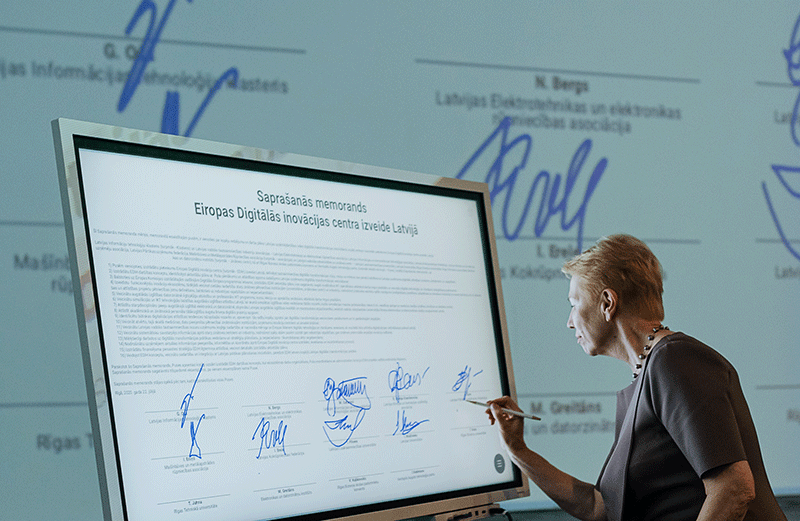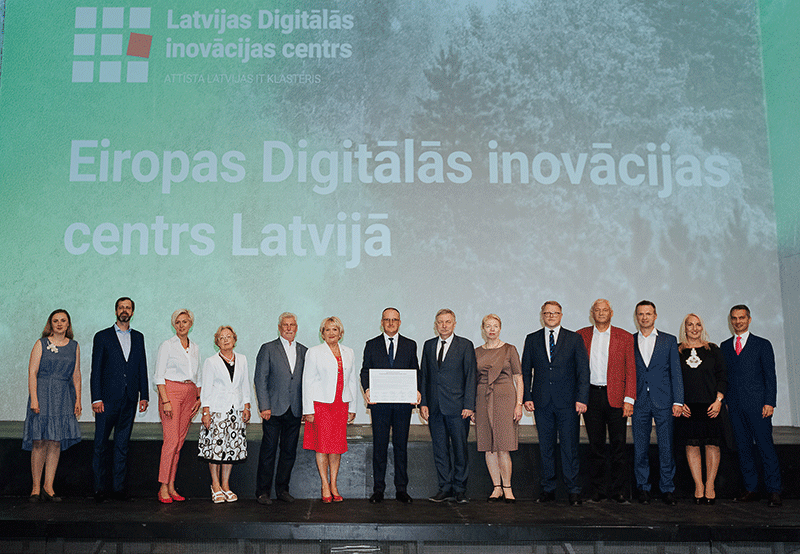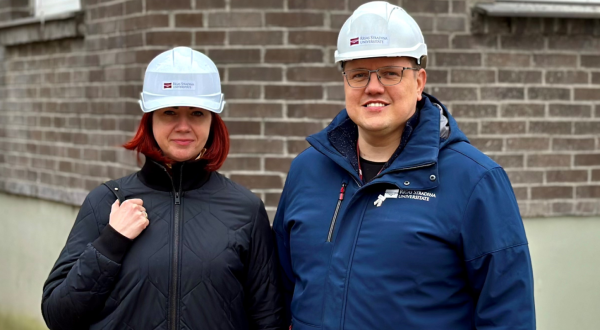RSU Signs Memorandum to Establish European Digital Innovation Center in Latvia
On Wednesday, July 22, the Latvian IT Cluster signed a memorandum of understanding (MoU) to establish a European Digital Innovation Hub in Latvia together with several cooperation partners, including Rīga Stradiņš University (RSU). Among the signatories are Latvia’s leading universities and scientific institutions, as well as a number of sectoral organisations. The MoU envisages that the parties involved agree on a common vision and work plan to promote the digital transformation of Latvian business and to jointly develop a national petition for the establishment of a European Digital Innovation Hub in Latvia.

RSU was represented at the event by Vice-Rector for Studies, Prof. Tatjana Koķe
The aim of establishing a European Digital Innovation Hub in Latvia is to promote the digital development of small and medium-sized enterprises, thus strengthening the competitiveness of companies’ production processes, products and services in accordance with the European Commission’s Digital Europe Programme. This will be achieved through the use of digital technologies and by providing access to technical knowledge and experimentation. The Digital Innovation Hubs and their network, which will cover the entire European Union, will enable public administrations and private companies to exchange information, receive support, and try and test digital innovations.
The Latvian IT Cluster initiated the MoU, which unites leading industry partners – both leading Latvian economic associations as well as universities and science hubs.

The MoU was signed by the Latvian Electrical Engineering and Electronics Industry Association, the Institute of Electronics and Computer Science, the Latvian Information and Communications Technology Association, the Association of the Latvian Chemical and Pharmaceutical Industry, the Latvian Forest Industry Federation, the University of Latvia, Latvia University of Life Sciences and Technologies, the Association of Mechanical Engineering and Metalworking Industries of Latvia, the Latvian Federation of Food Companies, the Advisory Board of Riga Business School, RSU, Riga Technical University and Ventspils High Technology Park.
RSU was represented by Vice-Rector for Studies, Professor Tatjana Koķe, who emphasises that the initiative is important because it creates extensive cooperation between different disciplines and sectors. ‘Cross-sectoral cooperation allows us to search for and find digital solutions in several sectors of the economy, but interdisciplinarity enriches each sector separately and opens up opportunities for innovations, for example, in such areas as digital medicine and medical education based on simulation technologies,’ said Prof. Koķe. Additionally she emphasises that a great added value is that the hub will have intergenerational cooperation, because ‘young people study at universities, while industry associations have experienced experts who are ready to cooperate with young minds’.
Signing the memorandum confirms that the parties involved agree that it is necessary to establish a high-level digital centre of excellence in Latvia and that the range of services offered will promote business productivity and competitiveness. It is important to identify digitalisation development trends in the manufacturing sector, as well as to promote the cooperation of Latvian manufacturing companies with national and European leaders in the implementation of digital technologies and solutions.

The association will also promote closer cooperation among universities, research centres and the industry. This will ensure the development of research and development projects by creating an innovation ecosystem, developing an interdisciplinary approach to higher education in computer sciences, strengthen the quality of Latvian higher education, bring international recognition and create more sustainable of computer science in accordance with labour market requirements. The parties involved undertake to jointly develop an petition for the establishment of a European Digital Innovation Hub in Latvia, defining the vision, mission and goals of the digital transformation of the national economy, which envisages grounding on the maturity, trends and needs of the digital development of Latvian companies.
Related news
 RSU is growing and developing: major reconstruction underway in the main buildingDevelopment, For RSU Employees, For Students
RSU is growing and developing: major reconstruction underway in the main buildingDevelopment, For RSU Employees, For Students


